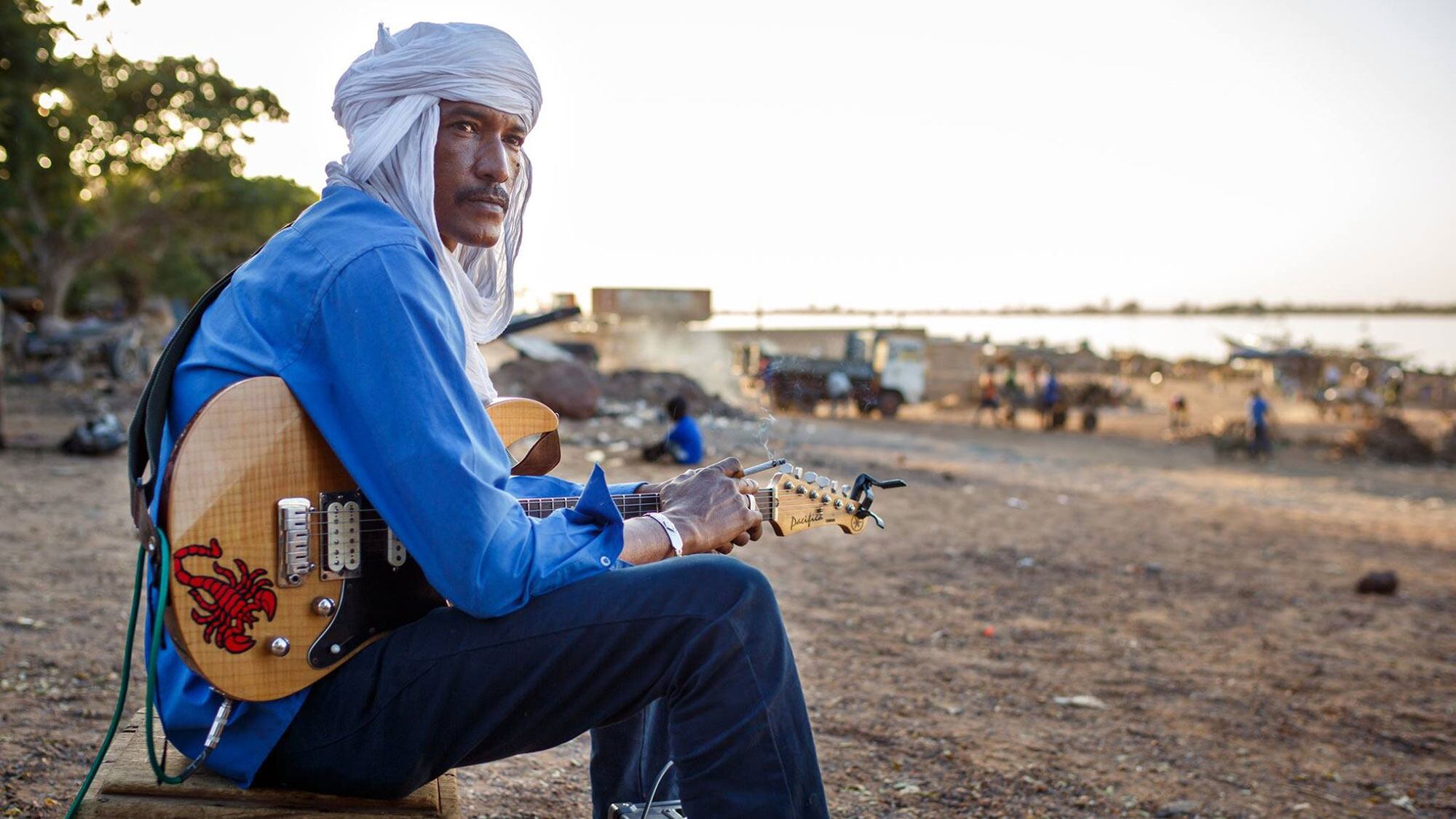Akaline Kidal, the latest album by guitarist Ahmed Ag Kaedy, evokes a windswept desert night in North Africa. It was recorded, however, in single, haunting takes on an 8-track cassette in a Portland basement.
Ag Kaedy intended for his album to recall the Kidal region in Mali—a homeland he's been banished from for playing music, and one he may very well never see again.
"It's music that carries with it a solitude," Ag Kaedy says about his new album. "The emotions are something, even for the Europeans or Americans to feel in the music. It's universal."
In recent years the guitar-driven protest music of the Tuareg people of North Africa has gained fans around the globe for its utterly hypnotic desert rock. While Tuareg guitar godheads Tinariwen and Omara "Bombino" Moctar play an amped-up, rock-'n'-roll- and blues-indebted version, singer and guitarist Ag Kaedy's eerily soul-stirring work harks back to the genre's acoustic, folkier roots.
The origins of modern Tuareg guitar music can be traced back to the 1980s, when Col. Muammar al-Qaddafi offered citizenship to Tuaregs in exchange for military service in Libya. Displaced and seeking the autonomy to create their own nation-state, legions of Tuareg people joined al-Qaddafi's ranks. With plenty of downtime and homesickness abounding, several Tuaregs—the members of the famed Tinariwen collective included—picked up the guitar and began churning out songs and recording them on cassette tapes. They recorded songs of yearning for home, songs of political strife and songs calling for rebellion. Soon enough, their music was declared illegal, the tapes became criminal contraband, and the musicians, now considered rebels, were threatened with severe violence if they were caught performing.
In the 1990s, Ag Kaedy would make the same pilgrimage to Libya for military training that many had made before him. But like Tinariwen, he instead received an education in the power of music. "I was a kid in the army, and I was in the final phase," Ag Kaedy told WW through translator, friend and Sahel Sounds founder Chris Kirkley, with whom the guitarist is staying in Portland. "I saw the guitar and wanted to know more about it. I played the drum for [the band], just so I could be around the guitar. When they finally went to sleep, I'd take the guitar and start to play."
When he returned to his home in Kidal, Ag Kaedy transformed his abode into a training camp of his own—an idyllic creative space that trafficked in music instead of warfare. Then, in 2012, Islamist extremists took power in the region and forbade all non-religious songs. Ag Kaedy's home was destroyed, his instruments were burned, and he was banished from Kidal. Ag Kaedy was told that if he ever returned to the town of his birth, his fingers would be cut off.
Still, Ag Kaedy continued to play. In his mind, there was no other choice. "The moment my fingers touched the strings and felt them vibrate, it gave me shivers," he says. "All my life I had wanted to join the military, like all the other Tuareg. But in that moment, I knew that this was what I wanted from this point on."
A large part of what makes Akaline Kidal such an entrancing listen is the effectiveness with which Ag Kaedy can pair the intonation of his singing voice with that of his guitar. The resulting sound is akin to two guitarists conspiring together. Though the album does not abide by Western musical forms, a careful listener can find corollaries to music more familiar to the Western ear as well. The picking on "Tikaras," for instance, sounds not unlike American guitarist William Tyler's psychedelic country-western-infused playing.
Though he sings in the Tamashek language, the emotions conveyed by Ag Kaedy come through clearly. "Poesie" finds the songwriter at his most heart-rending, with delicate but direct plucking of guitar strings accompanied by singing about the anguish of aging so far from home: "The more I age/The more it burns in my heart/Until all thoughts have turned to love."
Throughout Akaline Kidal, Ag Kaedy's masterful guitar-playing evokes plaintive and forlorn feelings of exile, of someone whiling away their years far from their homeland, set adrift by powers beyond their control. One can picture the softly plucked, nostalgic notes traveling across the vast ocean to the desert homes of friends and loved ones long left behind. In these notes one hears a lifetime of unanswered questions and a life irrevocably uprooted. Akaline Kidal traces back to the very genesis of the art form, to the reasons humans first sought to put into song what they could not with mere words—it expresses feelings too complex for conversation.
"When you hear it, it tells you a life, a story," says Ag Kaedy. "I hope that the people hear in the music what I hear."
HEAR IT: Akaline Kidal comes out on Sahel Sounds on Friday, March 1.

